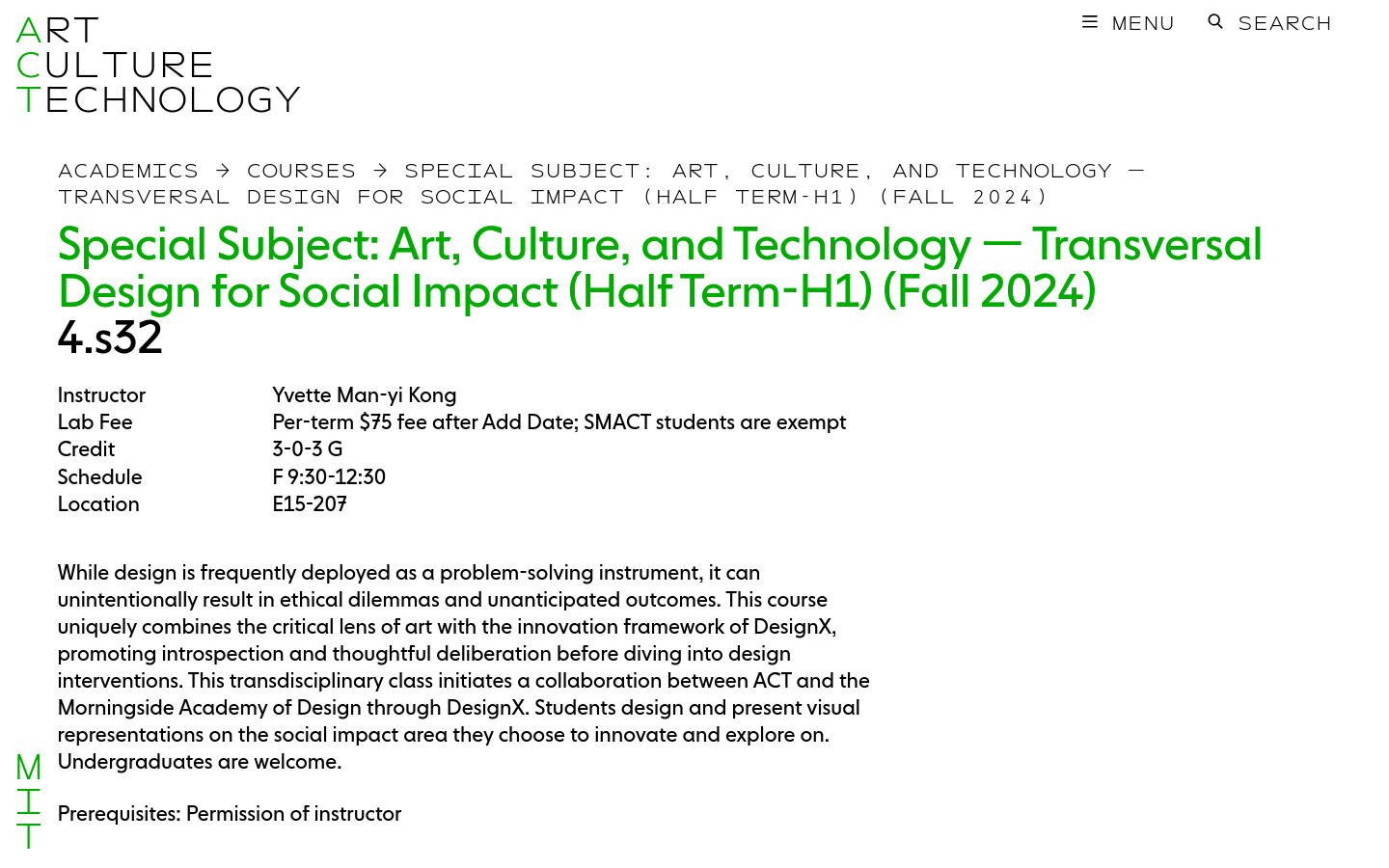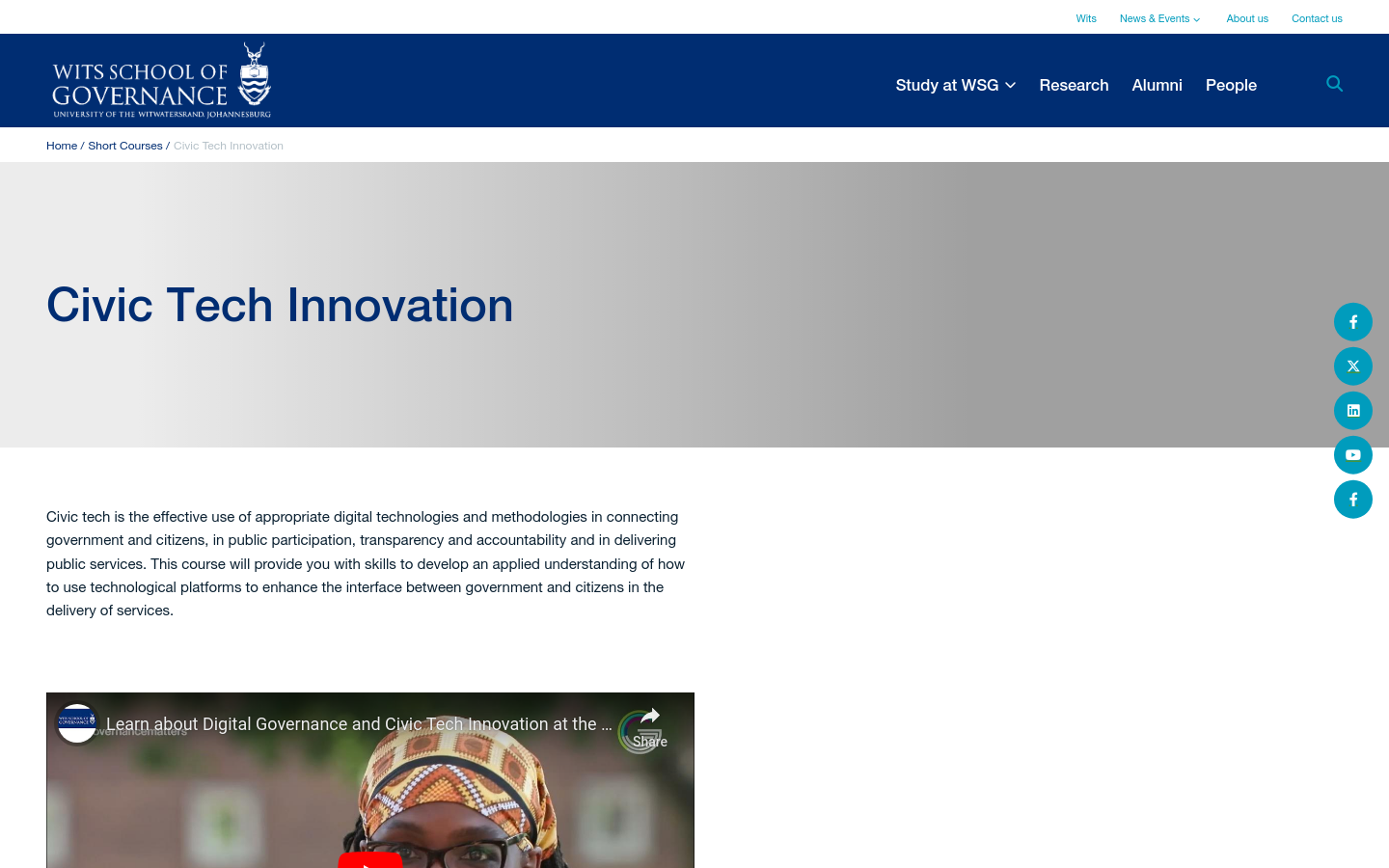Civic Tech Field Guide
Sharing knowledge and productively growing the fieldThe People > Learn about civic tech > Academia - (139)
Academic programs, relevant research centers, journals, and peer-reviewed articles.
Showing 139 Results

Bloomberg Center for Public Innovation at Johns Hopkins University
Johns Hopkins UniversityThe Bloomberg Center for Public Innovation at Johns Hopkins University drives innovation in local government by marrying cutting-edge practice with world-class research.

Transversal Design for Social Impact
Massachusetts Institute of Technology (MIT)This course uniquely combines the critical lens of art with the innovation framework of DesignX, promoting introspection and thoughtful deliberation before diving into design interventions.

Public Service Accountability Monitor (PSAM)
South Africa (South Africa, Afrika-Borwa, Suid-Afrika)PSAM’s activities include research, monitoring, advocacy and capacity building. Working through southern Africa, PSAM generates and shares knowledge about social accountability and the monitoring and advocacy tools that can build more open, participatory and accountable governments.

Center for Long-Term Cybersecurity (CLTC)
Berkeley, California, USAat University of California Berkeley

The Impact and Opportunities of Generative AI in Fact-Checking
Washington state, USAPaper by ROBERT WOLFE and TANUSHREE MITRA, University of Washington, United States

When 'doing ethics' meets public procurement of smart city technology – an Amsterdam case study
Amsterdam[A] multi-stakeholder co-design project – including a citizen panel – is an integral part of the process in which the service is designed and realized

The Internet & Democracy Initiative will study problems that have widespread information and social media implications.

Center for Labor and a Just Economy (CLJE:Lab)
Harvard University, Cambridge, MA, USACLJE:Lab is the policy and legal innovation lab at Harvard Law School’s Center for Labor and a Just Economy – where our ideas for building worker power and strengthening democracy hit the ground.

Civic Tech Innovation Short Course, Wits School of Governance
Johannesburg, South AfricaThis course will provide you with skills to develop an applied understanding of how to use technological platforms to enhance the interface between government and citizens in the delivery of services.

Ohio State Institute for Democratic Engagement and Accountability (IDEA)
Columbus, OH, USAWe seek to make democracy more deliberative – to empower people to talk across differences, find common ground, and build political change for the public good.

Design for America Studios
Chicago, ILStudios are nodes of community, design education, and localized impact within university campuses across the U.S.

Tech Policy Institute at Cornell
Cornell University, Ithaca, New York, USABrooks School of Public Policy

Consortium of Cybersecurity Clinics
United States of America (the)We are training the next generation of cyber leaders and safeguarding community organizations.

Citizen Clinic
Berkeley, California, USACitizen Clinic is a public-interest cybersecurity clinic at UC Berkeley.

The Belfer Center for Science and International Affairs
Harvard Kennedy School, John F. Kennedy Street, Cambridge, MA, USAResearch, ideas, and leadership for a more peaceful world.

Craig Newmark Graduate School of Journalism at CUNY
219 W 40th StAt the Craig Newmark Graduate School of Journalism at the City University of New York, change is in our DNA.

Science, Technology, and Social Values Lab (STSV Lab)
Princeton University, Princeton, New Jersey, USALed by Harold F

City AI Connect
Johns Hopkins UniversityA global community for cities to learn about generative AI together, faster.

Stanford Deliberative Democracy Lab
450 Serra Mall, Stanford, CA 94305, USAThe Deliberative Democracy Lab (formerly the Center for Deliberative Democracy), housed within the Center on Democracy, Development and the Rule of Law at Stanford University, is devoted to research about democracy and public opinion obtained through Deliberative Polling®.

Harvard Kennedy School of Government
Harvard Kennedy School, John F. Kennedy Street, Cambridge, MA, USA

#ISOJ
Austin, TX#GotaGoGama, which criticized Gotabaya's candidacy and highlighted human rights abuses.

Regulation, Evaluation, and Governance Lab (RegLab)
Stanford University, Serra Mall, Stanford, CA, USAWe pilot, build, and test solutions for compliance, mass adjudication, policy making, and government services

NuLawLab
Boston, MAThe NuLawLab is the interdisciplinary innovation laboratory at Northeastern University School of Law. We are leaders in the emerging global Legal Design movement.

The Decidim ‘soft infrastructure’: democratic platforms and technological autonomy in Barcelona
Barcelona, SpainPaper by Paolo Cardullo, Ramon Ribera-Fumaz, and Paco González Gil. "In this paper we focus on the platform’s ‘soft infrastructure’ – the network of developers, ethical hackers, academics, maintainers, advocates and activists, and city administrators but also the agreements with the city and the documentation produced – on its internal governance arrangements and the provincialising relationships these might entail."

eGovlab is the Stockholm University Centre for Excellence in e-Governance Studies focused on driving European and International research collaboration for research and development in the area of IT in the Public Sector.

EUfactcheck.eu
MechelenEUfactcheck, an initiative of the European Journalism Training Association (EJTA) fights misinformation about European policies and topics. Journalism students from all over Europe factcheck claims made by politicians and others and rate them.

The Knight-Georgetown Institute
Georgetown University, 3700 O St NW, Washington, DC 20057, United StatesGeorgetown has partnered with the John S. and James L. Knight Foundation to invest $30 million in a nonpartisan institute that helps policymakers and tech industry leaders address pressing issues related to technology, policy and ethics and make informed decisions on how technology is used to shape, produce and share information across platforms.

Curricular Resource: Public Interest Data Literacy
Georgia (US state)Public Interest Data Literacy (PIDLit) at Georgia State University weds the skills of data literacy with the frameworks and tools of public interest technology.

Princeton Center for Information Technology Policy (CITP)
Princeton University, Princeton, New Jersey, USAThe Center for Information Technology Policy is a nexus of expertise in technology, engineering, public policy, and the social sciences.

Polis (London School of Economics)
Houghton Street London WC2A 2AELondon School of Economics’ media think-tank in collaboration with the LSE’s Department of Media and Communications.

Cornell Tech
Cornell TechCornell Tech is a graduate campus and research center of Cornell University, located on Roosevelt Island, Manhattan, in New York City.

Jacobs Urban Tech Hub at Cornell Tech
Cornell TechMaking cities stronger, fairer, and more resilient through responsible technology.

Journal of Deliberative Democracy (previously the Journal of Public Deliberation)
University of CanberraThe Journal of Deliberative Democracy (formerly the Journal of Public Deliberation) is an open access journal publishing articles that shape the course of scholarship on deliberative democracy.

Immigration Policy Lab
Stanford University, Serra Mall, Stanford, CA, USAWith branches at Stanford University and ETH Zurich, IPL is an international community of scholars dedicated to innovation in immigration policy.

Boston University Initiative on Cities
Boston UniversityThe Initiative on Cities serves as a hub for urban related research and teaching across Boston University. We engage with urban leaders, policymakers, academics, and students from around the world to work toward sustainable, just, and inclusive urban transformation.

The Jack, Joseph and Morton Mandel School of Applied Social Sciences and the Case School of Engineering, two of Case Western Reserve University's top schools, have developed a Certificate in Data Sciences for Social Impact.

"Findings from this study presents a developed model that can support community engagement for urban innovation by specifying factors that influences community engagement for smart sustainable city development." by Bokolo Anthony Jr.

Public Interest Technology University Network: Understanding the State of the Field in 2021
Boston UniversityThis report from Katharine Lusk and Azer Bestravos of Boston University evaluates of the state of the field across the 43 academic institutions that make up the Public Interest Technology University Network as of the summer of 2021, providing insight into the ways in which PIT-UN members are investing in its five priority areas, and sheds light on the state of the field more generally.

Centre for Deliberative Democracy and Global Governance
University of CanberraAcademic center at the University of Canberra, Australia and publisher of the Journal of Deliberative Democracy

Do Open Meetings Affect Deliberation? A Comparative Study of Political Meetings In Two Institutional Settings
Norway (Norge, Noreg)A research article in the Journal of Deliberative Democracy by Espen Leirset

Public Interest Technology, MS at Arizona State University
Arizona State UniversityDo you have a passion for ensuring technology and innovation benefit society? Join this unique program and become a leader in examining and using technology for social good, whether in the public or private sector or in nonprofit organizations.

Paper: LocalView, a database of public meetings for the study of local politics and policy-making in the United States | Scientific Data
Harvard University, Cambridge, MA, USAA paper published in Nature introducing a database of public meetings in the US

Empathy Helps Counter Hate Speech
Stanford University, Serra Mall, Stanford, CA, USAA team of researchers led by Dominik Hangartner, IPL co-director and professor of public policy at ETH Zurich, has joined forces with colleagues at the University of Zurich to investigate what kind of messages could lead authors of hate speech to refrain from such postings in the future

Public Technology Leadership Collaborative
Data & Society Research Institute, West 20th Street, New York, NY, USAThe Public Technology Leadership Collaborative (PTLC) is a new peer learning collective of scholars, researchers, and government leaders committed to addressing the social and cultural implications of data and technology.

CHSR is dedicated to developing empirically-based knowledge to improve the design and delivery of services that address social issues and meet community needs in the Capital region, across New York State, and across the United States.

Research Excellence Framework Impact case study database
United Kingdom of Great Britain and Northern Ireland (the)"Documents put together by university departments that attempt to explain the reach of their research beyond academia."

NYU Public Safety Lab
New York UniversityUsing data + social science to support communities' efforts to improve equity and efficiency in public safety outcomes

Opening in early 2012, The Social Media Listening Center at Clemson University is an interdisciplinary, cutting-edge laboratory that seeks to monitor, measure, and engage in social media conversations from across the web.




